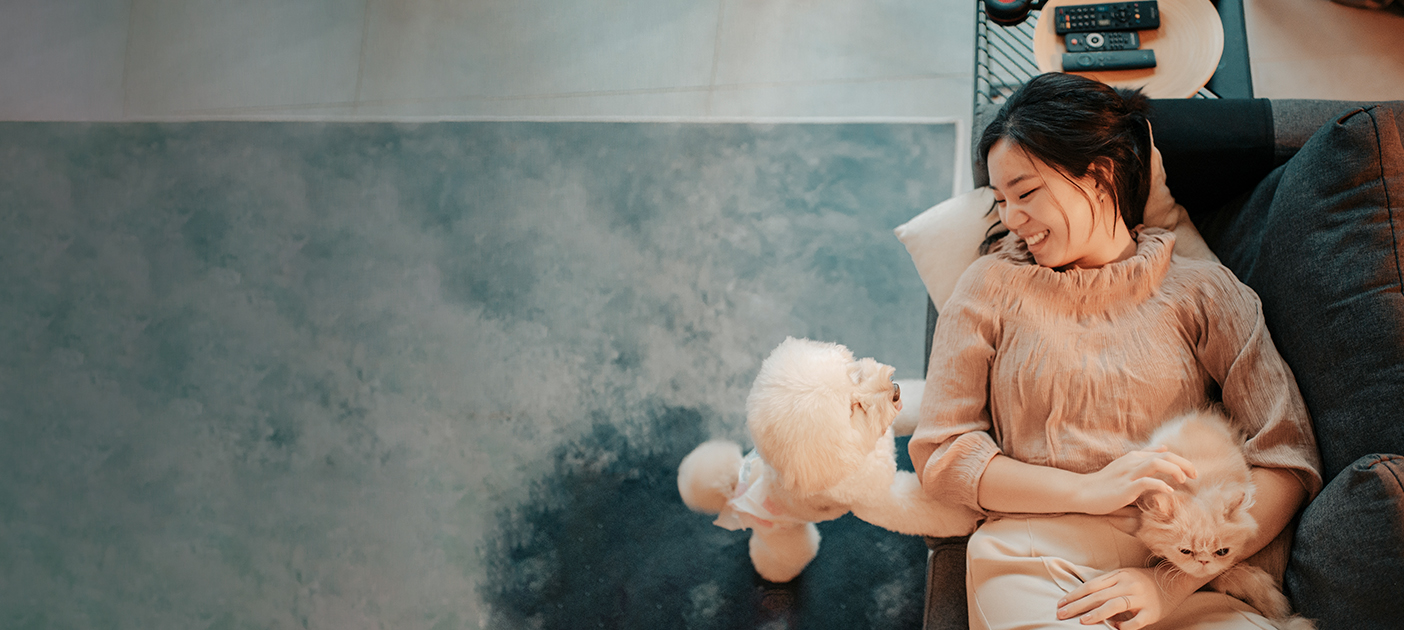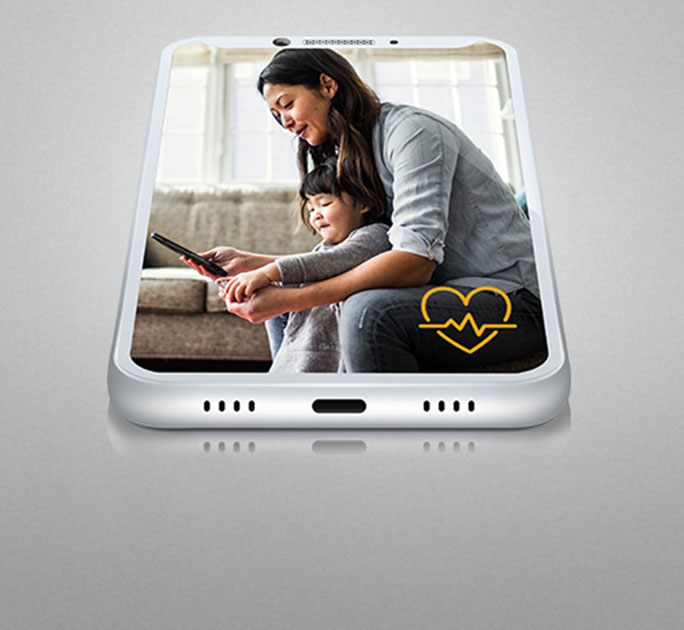
If you’ve only got a minute:
- The cost of owning a pet goes beyond initial one-time costs. Ongoing expenses such as food, veterinary care and miscellaneous pet care supplies are other expenditures to consider for the long haul.
- Beyond just finances, pets require time, affection, and commitment.
- Do your research and create a budget to determine whether you can afford to own a pet, as well as the necessary care and attention it needs, before getting one.

The idea of getting a pet may seem fun and exciting, especially for animal enthusiasts. However, owning a pet is far from something you do on a whim.
Much like raising a child, pets can come with hefty costs and its set of responsibilities and challenges. The cost of owning a pet in Singapore can vary depending on the type of pet you have and the level of care you provide.
One-time costs
The costs of owning pets can be split broadly into one-time costs and recurring costs.
Adopt or buy
The decision to adopt or buy a pet is a personal one that depends on your circumstances and preferences. Generally, adopting a pet is relatively cheaper than buying it.
To ensure a good fit, most animal shelters or rescue organisations include stringent interviews and screening processes. Adoption fee typically ranges from S$0 to S$500, depending on the type and breed of pets, and varies among organisations.
For example, it costs S$20 to adopt a hamster from Hamster Society Singapore, S$100 for a single rabbit and S$150 for a bonded pair from Bunny Wonderland, S$100 to S$150 for a cat from Causes of Animals and S$300 for a dog at Save Our Street Dogs (SOSD).
Some organisations like Animal Lovers League do not charge adoption fees. Still, such fees may still be a significant expense, particularly if you are seeking to adopt a purebred or exotic breed as they tend to cost more.
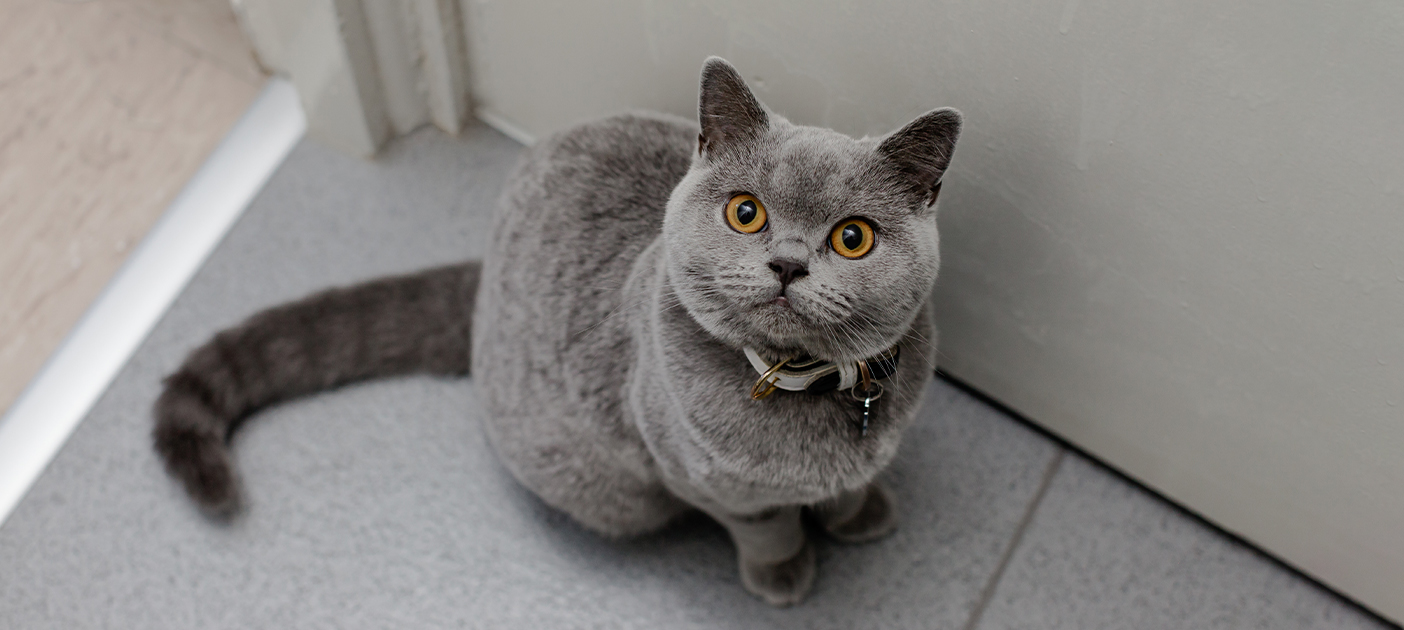
The cost of pedigree cats has increased too. A local cattery lists the cost of Ragdoll kittens as ranging from S$4,000 to S$8,500 and up, depending on breed standards. A British Shorthair cattery lists the cost of its kittens as upwards of S$8,000.
Small animals such as rabbits, guinea pigs, chinchillas and hamsters can cost from S$20 to S$300 or more depending on the breed and age. Common pet birds such as parakeets can cost anywhere from S$20 to S$200, while exotic birds such as macaws can cost several S$1,000 or more.
Microchipping
It is mandatory for pet dogs to have their microchip registered in Singapore. Owners and caregivers of other pets (e.g. cats, large birds, rabbits) are strongly encouraged to microchip and register the animals with Animal Veterinary Service (AVS) too. The purpose and advantage of microchipping your pet increases the chances of reuniting with your pet if it gets lost or stolen.
Every microchip number is unique, just like your NRIC number, it serves as an identifier that is tamper-proof. Details of your pet, your name and contact details can be registered in AVS’s microchip registry. If someone picks up your lost pet and brings it to the vet for a microchip scan, the clinic can easily reach out to you.
Cost of microchipping typically costs around S$20 for small animals and anything from S$50 to S$100 for dogs and cats.
Sterilisation
Pet sterilisation is a responsible choice for pet owners who want to prevent unwanted litters and reduce the risk of contributing to the overpopulation of animals in the community. It also helps with reducing the number of strays on the streets.
If your dog or cat is not spayed or neutered, you’ll need to budget for this one-time surgery, which usually cost from about S$350 to S$500, or more, depending on the weight of your pet. For bunnies, the cost ranges from S$200 to S$300.
Generally, it is more expensive to sterilise female pets compared to male pets since the process is usually more complicated.
There may also be unexpected costs such as pre-anaesthetic and blood tests to check if it is safe for your pet to undergo general anaesthesia. This can potentially set you back another S$200. Post-surgery medications may cost you another S$20 - S$100.
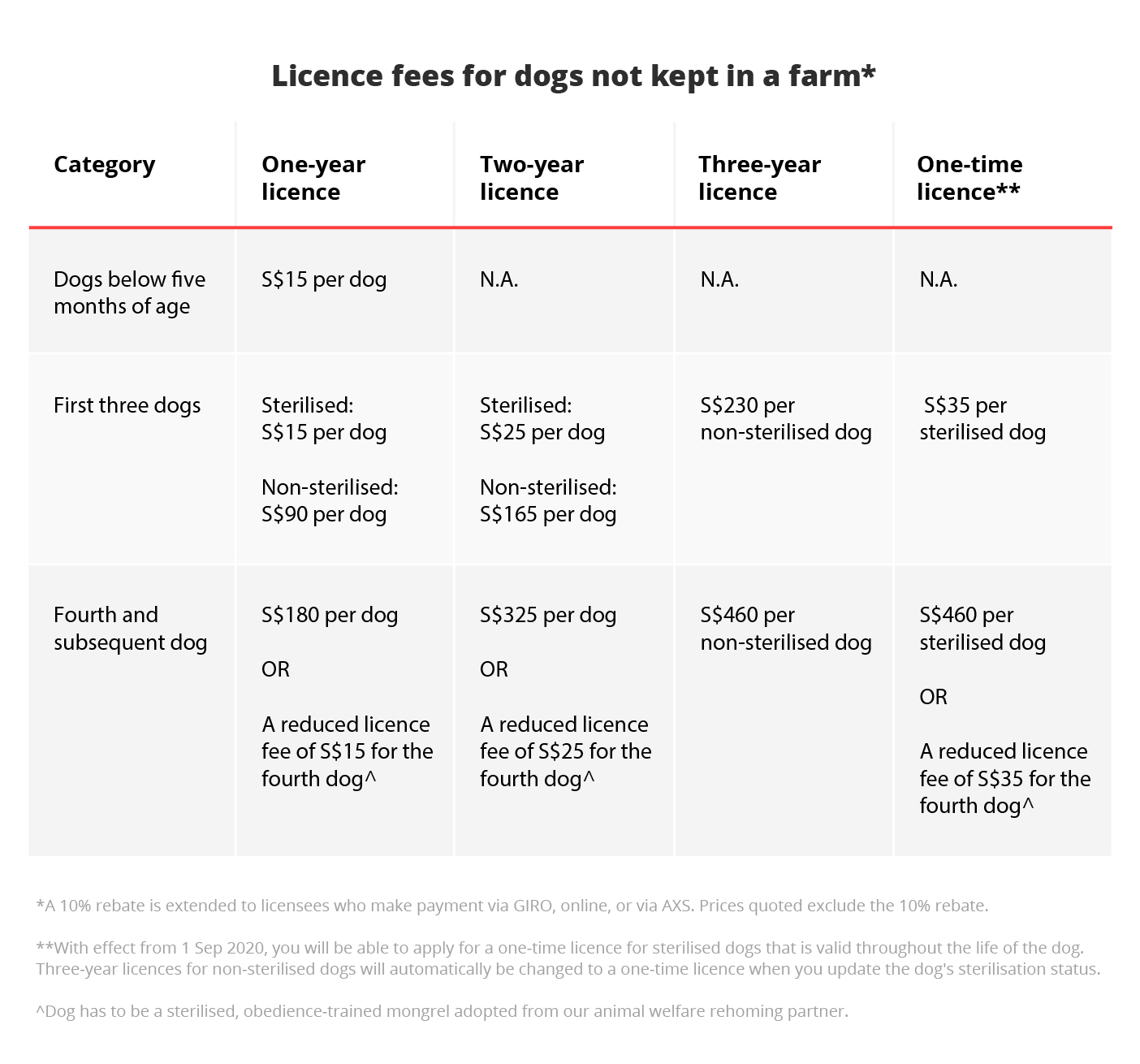
Licensing
If a pet dog is what you desire, you can apply for a one-time licence of S$31.50 (online payment), that is valid throughout the dog’s lifetime, provided that your dog is sterilised. If your dog is not sterilised, you can opt for a yearly licensing fee of S$81 or go for the 3-year licence at S$230 for greater savings ( S$77 per year).
Recurring costs
It is crucial to note that the cost of owning a pet goes beyond initial one-time costs. Ongoing expenses such as food, veterinary care and miscellaneous pet care supplies are other expenditures to consider for the long haul.

Food
The cost of pet food varies depending on the size, age, and dietary needs of your pet. For example, a 15kg French Bulldog with food and skin allergies that requires special veterinary prescribed kibbles will probably set you back approximately S$150 to S$250 monthly. On the contrary, the cost of food for a similar sized dog with no food allergies is significantly lesser, usually varying from S$50 to S$100 a month.
Food for smaller pets like hamsters and bunnies cost less and ranges from S$20 to S$50 monthly. Bear in mind these costs do not include other fancy treats or snacks for your beloved pet.
Grooming needs
Grooming packages for dogs and cats ranges from S$50 to S$200, depending on the size of the pet and the type of services required. For example, grooming a small dog (chihuahua and, pomeranians) can cost between S$50 to S$80 per each session, while grooming a larger dog (golden retriever, Siberian husky) can cost up to S$150 or more.
Unless you own a long-hair pet with voluminous fur that requires frequent taming, most cats and short-hair dogs are generally lower maintenance in the grooming department. Of course, if you have some spare cash and wish to pamper your pet further, you may go for premium services such as spa and massage packages at additional cost.
There are some salons that offer basic grooming services to smaller animals (guinea pigs, rabbits, hamsters and chinchillas) at lower cost from S$30 to S$50, which includes nail trimming, a bath and a brush-out.
Vaccination
Basic vaccinations can cost between S$50 and S$100 per vaccine, and some pets may require multiple vaccines. For example, your pet dog will need a series of vaccinations in its first year, followed by annual booster shots costing S$30 to S$60 subsequently.
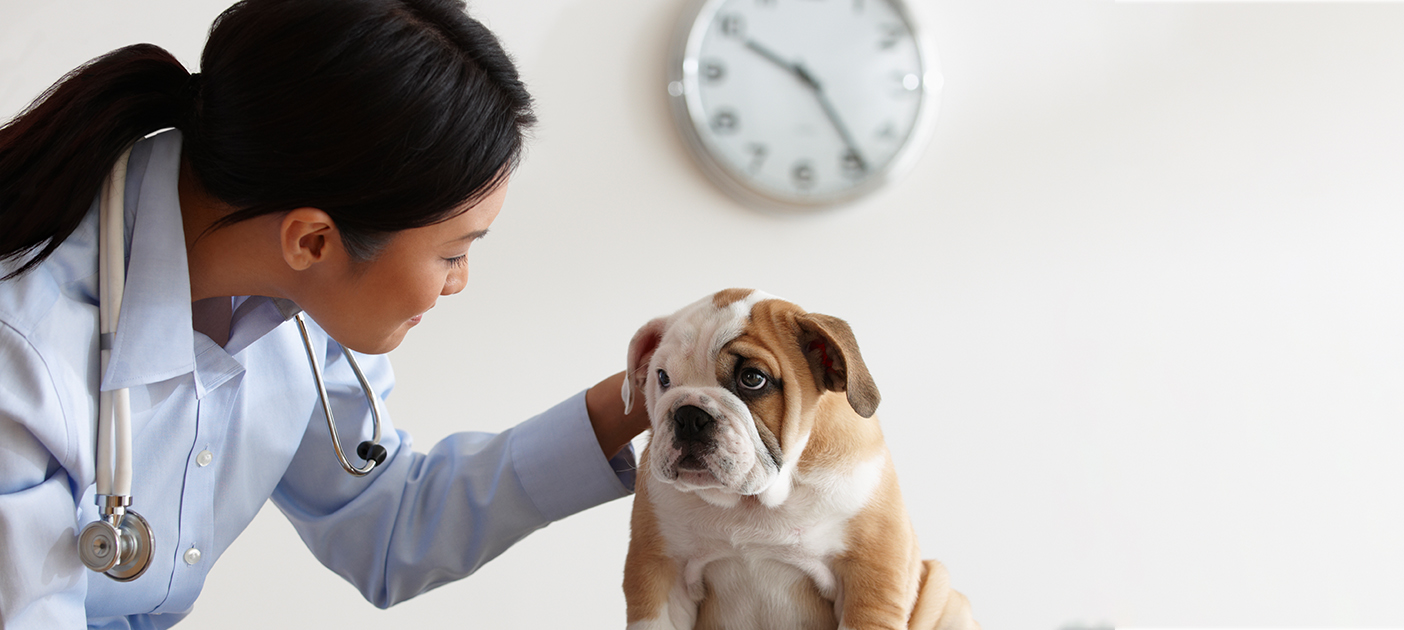
Medical expenses and dental care
It is safe to say that smaller animals like hamsters, bunnies and guinea pigs generally require less medical care, and rarely or never need dental procedures as compared to dogs and cats.
Unlike humans, pets have no medical subsidies. Teeth cleaning and extraction for dogs and cats and can cost between S$200 and S$600. The cost of this procedure is high as general anaesthesia is required.
If you are a dog owner, while it is not compulsory for you to bring your dog to the vet for regular upkeep, you do need to make sure that your furkid is on top of things in terms of deworming, heartworm and flea prevention, since they require daily walks outdoor. This can easily set you back by another S$30 to S$50 monthly. Mind you, this does not include the basic veterinary consultation fees that will cost you another S$30 to S$80 per visit.
Likewise, if your pet falls sick or gets injured and requires immediate medical attention, the total bill can once again easily go up to a few thousands of dollars, depending on the complexity of the medical procedure.
Other pet supplies
Small cages for rabbits and hamsters for instance can cost anywhere from S$55 for the most basic plastic cage to S$500 for wooden, luxury cages. Toys and accessories to help them stay active and healthy such as hamster wheels can cost between S$5 and S$50, depending on the size and material.
Also, it is essential to change your pet’s bed and leash every few months due to wear and tear. Some pets may also require new toys every few months, especially if they’re prone to damaging their toys.
If you drive, you may want to consider investing in a protective car seat cover since most dogs and cats are prone to fur shedding. More importantly, you wouldn’t want to risk your car seat getting destroyed from accidental scratches.
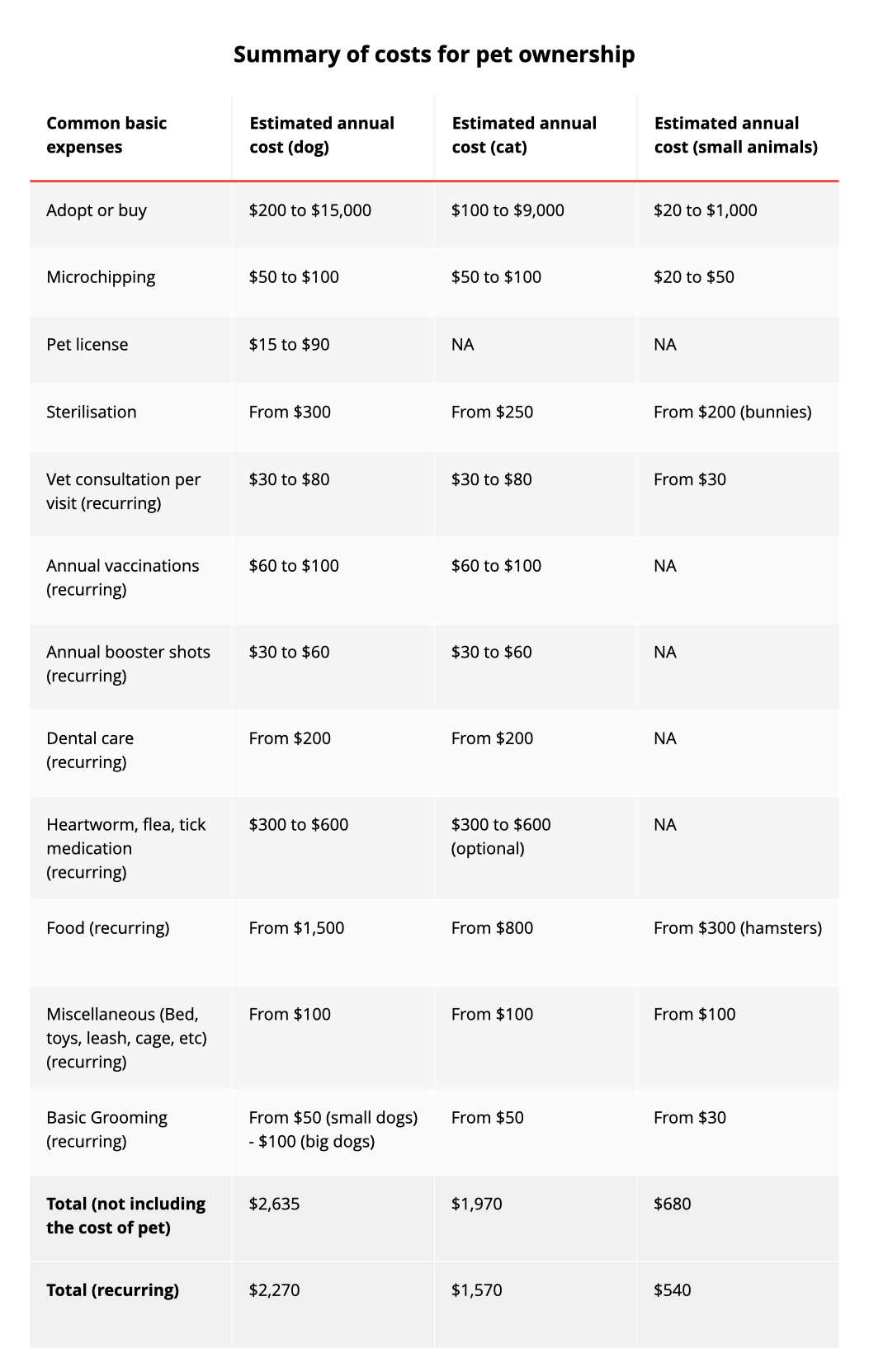
Training school (mainly for dogs)
If you are looking to go the extra mile to provide for your dog, you may consider puppy training, basic obedience training, behavioural training, and private training. Training classes range from S$50 to S$200 each session, depending on the curriculum.
It is entirely possible to train your dog by yourself though, so don’t count training classes as a massive must-have.
Pet insurance (dogs and cats)
Pet insurance can provide peace of mind and financial protection in case your pet falls sick or suffers from injuries. But it doesn’t run cheap. Depending on the insurance provider and policy, pet insurance typically provides coverage for medical expenses due to accidents and illnesses, loss of dog due to theft, chemotherapy, death, cremation, third-party liability and more.
Basic pet insurance prices start from S$70, with more comprehensive plans charging up to S$800 or more a year.
The best time to get insurance for your pet is when your pet is young and healthy as pre-existing conditions are usually not covered, but if they are, expect to pay a much higher premium.
When shopping for suitable pet insurance, do your research and choose a policy that meets your needs and budget. Always check the fine print, as these plans often include disclaimers and exemptions.
Cleaning and home maintenance costs
You may also want to factor in costs for additional cleaning agents or tools required to clean your house, particularly if your pet sheds a lot. Let’s not also forget wet wipes and sanitisers needed to clean your pet, and disinfect the furniture surfaces your pet steps on.
Cats are notorious for pawing and they also have a natural urge to scratch, as do dogs. That means you’ll have to expect damage to pretty much anything in your home, along with the cost of replacing it.
Pet boarding/sitting
If you’re travelling and have no one else at home to look after your pet, you may have to find alternative arrangements such as pet boarding, hire someone to pet sit, and dog-walking. These can easily cost you S$20 to S$150 or more a day.
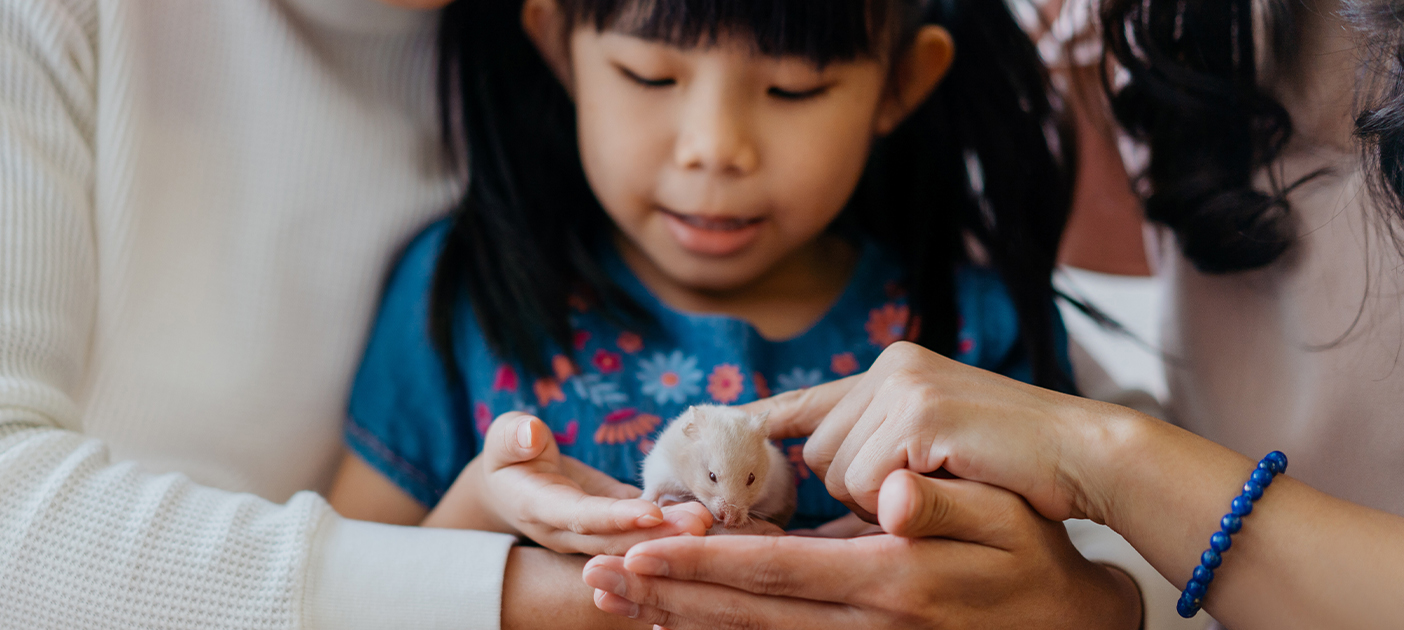
3 things to consider before getting a pet
Getting a pet can be a wonderful and rewarding experience, but it’s important to carefully consider being committing to one.
Commitment/time
Pets require time and attention for feeding, grooming, exercise, play and training. Consider your work schedule, lifestyle, traveling habits, and other commitments to ensure you have enough time to care for your pet.
Additionally, pets can live for many years. Make sure you are ready to commit 100% as it is afterall a long-term commitment and a huge responsibility. You should never abandon your pet!
Financial costs
Having a pet also means more expenditure, less savings and money for yourself. With ongoing costs for food, toys, veterinary care, grooming and other supplies that can add up quickly, consider your budget and work out whether you can afford the ongoing expenses of having a furry plus one in your life.
Ethically bred?
As a responsible pet owner, you want to make sure prior research is done to ensure that the pet you are getting is ethically bred, as unethically bred pets are more susceptible to genetic health problems and behavioural issues that can lead to costly vet bills and a decreased quality of life for you and your pet. Practice due diligence in your research in choosing a reputable pet shop or breeder.
Alternatively, consider adopting from a shelter to ensure that you are providing a safe and loving home for your furry friend.
Alternatives to owning a pet
If you feel that you are not ready to have your own pet, there are other options that can provide the companionship you crave, and at the same time, give you a sense of fulfilment too.
For example, you can help to care for others’ pets while they are away and earn some passive income while indulging in your love and affection for animals by pet-sitting or dog walking - it’s a win-win! Or consider volunteering at animal shelters and pet fostering, where you can care for a pet temporarily until they find a permanent home. Alternatively, enjoy a nice meal while spending time with pets in a café setting without assuming the responsibilities of owning one.
All in all, it’s a good idea to do some research and create a budget to determine whether you can afford to own a pet and provide it with the necessary care and attention it needs. Carefully consider whether you are ready and able to take on these responsibilities before deciding to get a pet.

